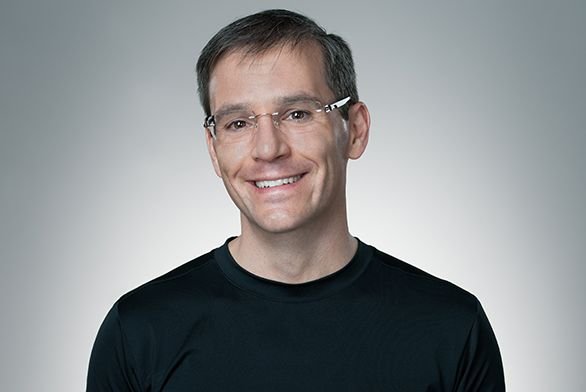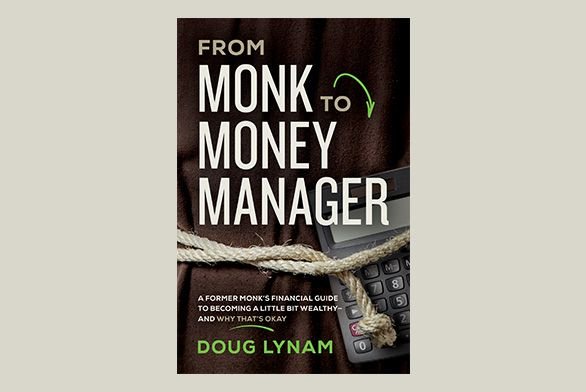From Monk to Money Manager: One Alum’s Journey
March 25, 2019 | By Kimberly Uslin

Growing up in a wealthy family, Douglas Lynam (SF96) saw firsthand the adverse effect money can have on people. He was so disturbed by it, in fact, that he joined a monastery after graduating from St. John’s and took a vow of poverty.
A decade later, he had made his peace with the reality—and necessity—of money in contemporary society. Now working as a financial advisor and a finance cartoonist, he publishes his new book, From Monk to Money Manager, on March 26.
“My family idolized money. And in the monastery, we believed that money was the root of all evil,” he explains. “I found that neither extreme is successful for folks, because my family shattered and the monastery went bankrupt. So I vowed to learn everything I could about money management to make sure I never repeated either mistake.”
Lynam’s monetary education began while he was still a practicing monk. When guests would come to the monastery, he noticed that they were often not only having spiritual difficulties, but financial ones as well.
“I’d pray for them, but also insist we make a budget, because the universe is not going to work a miracle to fix a problem that you have the power to solve,” he says.
He had a knack for the work, and soon, he was providing financial consultation to many guests and attempting to solve the monastery’s considerable monetary woes. While he wasn’t able to save the monastery—years of bad bookkeeping and budget balancing couldn’t be overturned—Lynam had found his passion … and the topic for his first book.
“From Monk to Money Manager tries to bring the best money management practices and the highest ethical values together,” he says. “St. John’s is critical in that journey because it taught me excellent critical thinking skills and opened me up to the world of spirituality in a way I had been completely closed off to.”
This was due in large part to Mr. Charles Fasanaro, a tutor on the Santa Fe campus whom Lynam grew close to while working on his senior essay on Blaise Pascal.
“He was so instrumental in shaping my life and guiding me toward a deeper spiritual practice,” he says. “When I first started the Program, I was pretty hostile towards religion and spirituality. But one of the things the Program showed me was that as you look at all the different thinkers and philosophers and brilliant minds throughout the course of human history, they’re each saying something different. So how do you synthesize it all? You’ve got this wealth of experience that’s been lived, taught, and passed down through the tradition of civilization. How do you figure out for yourself what’s important and find out what your values are? That’s the real question. Of course, there’s no simple answer and it is a lifelong journey, but I think St. John’s sets one up for the adventure very brilliantly.”
The book, Lynam explains, is his exploration of one central idea: that money is the root of everything, good and evil, and that one must do whatever is possible to make it serve the good—however that is defined for oneself.
As he puts it, “It’s not up to me to tell you what your values are, but what I can do is show you how money can be used to serve your values more fully and live the most abundant life that you can.”

The book offers the basics of personal finance and macroeconomics, with the central thesis that growing wealthy is no longer a zero-sum game. In the experience of many Program authors, Lynam explains, particularly those prior to Adam Smith, growing wealthy almost always required someone else to be poor and oppressed. That’s why the concept was so frequently censured by the Bible, Socrates, Seneca, and many others.
“The middle class hadn’t been invented yet. Separation of powers hadn’t been invented yet. Democracy as we understand it, the rule of law—these things didn’t exist,” he says. “Now, no one has to suffer for me to earn a living, make money, save, and invest it wisely.”
Lynam explains his philosophy as a synthesis of Program authors Karl Marx and Adam Smith. He acknowledges the problems with capitalism Marx analyzed and Smith’s “brilliant understanding of how free will and freedom of choice in our individual decisions … produces the best possible outcome for all of us”—without ceding to either communism or the oversimplified power of individual selfishness.
This requires a conscientious approach to money management. He just co-launched a nonprofit called the ESG Fiduciary Institute, which is built to ensure that financial advisors are always serving the best interest of their clients—which, to him, means sustainable business and investment practices. (A recent example: His asset management team recently built the first environmentally sustainable teacher retirement plan for a school.)
“Investing for the future while destroying the future makes no sense,” he explains, “so you have to take an ethical, environmental, and sustainable approach to building wealth at all times.
Every major social problem, such as drug abuse, crime, lack of education—all of them can be reduced by increasing a person’s net worth. And we now know that financial health has a bigger impact on overall well-being than physical fitness, relationship stability, and job satisfaction combined. You’re not going to find contentment until you come to peace with money and find a way to build a sustainable future for yourself financially.”
It’s this point, he says, that is most critical to Johnnies.
“If you’re going to go out into the world and take the wisdom you’ve learned from the Program and put it into action, you’re going to need to use money to do that one way or the other. Spirituality and economics are not in conflict.”

